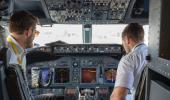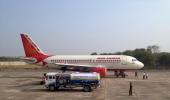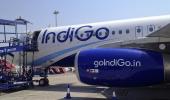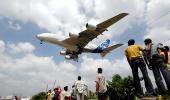Increasing cases of aviators in India complaining of fatigue and in some cases leading to death have spurred the DGCA to bring in draft rules to reduce stress.

In what may be a welcome sign of changing times, India's aviation regulator, the Directorate General of Civil Aviation (DGCA), has come out with draft Civil Aviation Requirements (CAR) which propose more rest for pilots, the workhorses of any airline.
With an increasing number of pilots reporting fatigue and even dying in the world's fastest growing aviation market, the DGCA has decided to ameliorate the situation.
It has proposed the draft CAR (open for comments), which will supersede the earlier one of April 24, 2019, where pilots' health concerns have been specifically noted.
In India, pilots have often complained about being overworked by their aggressive and fast expanding airlines.
Even as the DGCA launched a review of pilot fatigue data, the aviators formed an association in August 2023 after three tragic pilot deaths to highlight issues of safety, fatigue and employment.
It is not uncommon to find pilots complaining about erratic rosters and sleep deprivation to such an extent that they fall asleep in the cockpits.
Some of the changes proposed under the new CAR are as follows.
The definition of night duty, for example, has been extended by one hour (from the earlier 12 am to 5 am to 12 am to 6 am now). Also, the minimum weekly rest period has been increased to 48 hours from the earlier 36 hours.
The extra 12 hours can make a difference.
The draft further says there will be a reduction in the number of landings between 12 am to 6 pm to two landings.
In addition, if there is a break of more than six hours, 'suitable accommodation' has to be provided if any part of the break encroaches into the Window of Circadian Low (between 2 am and 5:59 am).
Earlier, suitable accommodation was to be provided only if the break 'fully' encroached into the Window of Circadian Low.
Also, in case of unforeseen operational circumstances, flight time may be extended by a maximum one hour (instead of the earlier one-and-a-half hours) and flight duty period by a maximum of two hours, instead of the earlier three hours.
The head of operations of the airline will now have to submit a monthly report to DGCA on extensions granted.
While earlier, rest facility for crew meant just a bunk or seat with leg and foot support, now there are more detailed definitions of different types of rest facilities.
A 'bunk' now means a 'surface that allows for a flat or near flat sleeping position.
'It reclines to at least 80° back angle to the vertical and is located separately from both the flight crew compartment and the passenger cabin' so as to allow the crew member to control light and provides isolation from noise and disturbance.
It also defines an isolated rest seat in an aircraft cabin that reclines at least 45 degrees back angle to the vertical, has at least a pitch 55 inches, a seat width of at least 20 inches and provides leg and foot support.
It is separated from passengers by at least a curtain to provide darkness and some sound mitigation and is reasonably free from disturbance by passengers or crew members.
In addition, it defines basic seat rest as a seat that reclines at least 40 degrees from the vertical, provides leg and foot support and is separated from passengers.
The draft CAR has now made 'fatigue' a part of annual training and the head of operations of the airline will now have to submit a quarterly report to DGCA on fatigue reports received and action taken.
Earlier, the DGCA had just issued a general advice to operators asking them to ensure that personnel concerned with operations of aircraft are trained and educated regarding dangers and management of fatigue.
While it says that fatigue reports should follow a non-punitive and confidentiality policy, the reality may be different.
The draft also clarified that the operator shall include the optimum time of transportation for each base after taking into account various factors and on ensuring that the rest period does not get reduced below the minimum rest requirements.
The period of transportation to and from an airport shall neither be counted towards duty time nor rest period. However, if the transportation time is more than 30 minutes, the rest shall increase by twice of time above 30 minutes.
How this will be implemented for pilots staying at different places in various bases and for different hotels in various stations needs to be seen.
However, industry veteran Captain Shakti Lumba tweeted that the draft has only made cosmetic changes to the CAR of 2019 and the basic issue of fatigue reduction has not been addressed as per ICAO Annex 6.
One of the provisions of this Annex is that two types of fatigue should be taken into account for crew -- transient fatigue and cumulative fatigue.
'Transient fatigue may be described as fatigue that is dispelled by a single sufficient period of rest or sleep.
'Cumulative fatigue occurs after incomplete recovery from transient fatigue over a period of time.'
It says there is a necessity to limit flight duty periods with the aim of preventing both kinds of fatigue.
Lumba says there has been no attempt to introduce FRMS (Fatigue Risk Management) by operators.
The increasing emphasis on pilot fatigue now was the news of three tragic pilot deaths within three days in August 2023.
Two were confirmed as cardiac arrests. The first incident took place in Nagpur when an IndiGo pilot collapsed just before boarding his flight to Pune. He died later.
Then there was a Qatar Airways pilot who died on the way from Delhi to Doha. Last was a senior pilot with LATAM who died after collapsing in the bathroom of a Miami to Chile flight.
These are wakeup calls to the aviation industry to look within and heal their most valuable asset -- pilots. But will airline managements listen to them and ensure safety or keep chasing profits in this fast expanding sector?
Shobha John is a senior journalist.
Feature Presentation: Ashish Narsale/Rediff.com










